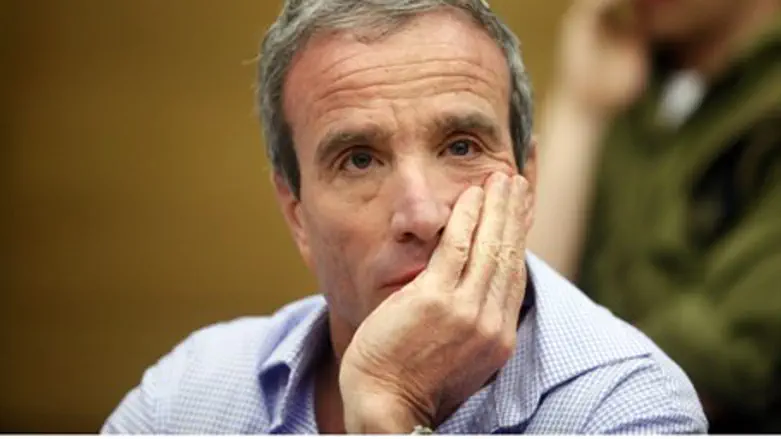
The Religion and State lobbying group convened Wednesday to discuss the Chief Rabbinate's refusal to recognize decisions made by rabbis in the US, particularly in the context of immigrants wishing to verify their marriages and their Jewish status before Aliyah.
Jews are required to confirm their Judaism through a local rabbi before being able to legally marry in Israel. However, not all rabbis make the Chief Rabbinate's cut for reliability - and the criteria for a qualified rabbi has remained unclear, the group claimed. The ambiguity has led to problems with new married immigrants, who sometimes find that while they think they are halakhically married (i.e. according to halakha, Jewish law) abroad, the Chief Rabbinate has prevented them from marrying in Israel.
MK Eliezer Stern (HaTnua) proceeded over the hearing, stating that "despite all of our different opinions on the subject, what every one of us understands is that the current situation [. . .] is distancing Jews from Judaism and reducing the number of Jews in Israel and the Diaspora."
He continued, "we came here today with the belief that Israel is a Jewish-Democratic state - not only Jewish or only democratic - and that sometimes it comes at a price: that sometimes Judaism needs to bow to the rules of a democracy, and sometimes a democracy needs to bow to the rules of Judaism."
Justice Minister Tzipi Livni (HaTnua), who was also participating, announced that "we are beginning a process of connecting Jews in Israel and Jews abroad through the enacting of laws to make Israel more Jewish-Democratic."
MK Aliza Lavie (Yesh Atid) added, "there is a constant process of adding stringencies to conditions set by the Rabbinate, and what is permitted today will be forbidden tomorrow. There are no clear rules, there are no set regulations, and people find themselves uncertain about what the law is."
Lavie emphasized the importance of enacting legislation which would eliminate Rabbinic ambiguities. "The Chief Rabbinate continues to distance themselves from entire communities abroad - is it any wonder that people are looking for alternatives to the Rabbinate?"
Rabbi Shaul Farber, director of the Itim Group for religious dialogue, explained, "until now we knew that legally confirming the Jewish status of Russian immigrants could often be complicated, due to the difficulties they suffered under Communist rule. Now American Jews are also being doubted - but these are well-established communities, which have been lead for decades under known Torah scholars."
Farber urged the Rabbinate to reconsider its tougher policies. "You must understand that this can cause a deep chasm between American and Israeli Jewry. Jews who consider Israel the home of the Jewish nation are discovering that their homeland will not recognize their Judaism. It is inconceivable that a rabbi in Petah Tikva will not recognize the authority of a rabbi in the US because the latter holds an opinion that is slightly more liberal or different than his own."
Shmuel Shetach, the CEO of the left-Orthodox Ne’emanei Torah V’avodah and the representative of Rabbi Avi Weiss of the controversial Open Orthodoxy group in discussions with the Israeli Rabbinate, also spoke during the hearing, calling for sweeping solutions. According to him, the problems with the Rabbinate are not isolated.
"There needs to be wide-scale changes in the religious processes in Israel to make them more democratic, which would transfer the authority and the state funding from a centralized institution to the religious communities themselves," he said. "This way, religious communities can take responsibility for religious life into their own hands, and they can choose their own leaders."
Currently, Rabbinic leaders of Israeli cities and towns are chosen by the state. "The community-based solution solves several of the problems we have been dealing with lately," Shetach concluded.
However, just this week, an historic Rabbinic agreement was signed by the accepted Orthodox leadership of American rabbis, the Rabbinic Council of America (which has strongly criticized Rabbi Weiss' actions as well) and European rabbinical councils which declared Israel's Chief Rabbinate the undisputed leader of the Jewish world.
The Chief Rabbinate has released an official response to claims of discrimination against American Jews, denying the existence of a "blacklist" and clarifying the process.
"Confirmation of a Jew's status takes three steps: 1. It is examined whether or not the Diaspora rabbi confirming the status was ordained by an institution recognized by the Chief Rabbinate of Israel; 2. It is examined whether or not that rabbi and the institutions he is involved with operate according to Jewish law; 3. It is determined whether or not the rabbi in question has the knowledge and resources to determine an applicant's Jewish status."
The statement concluded by insisting that each case is examined individually, without a blanket discriminatory policy.